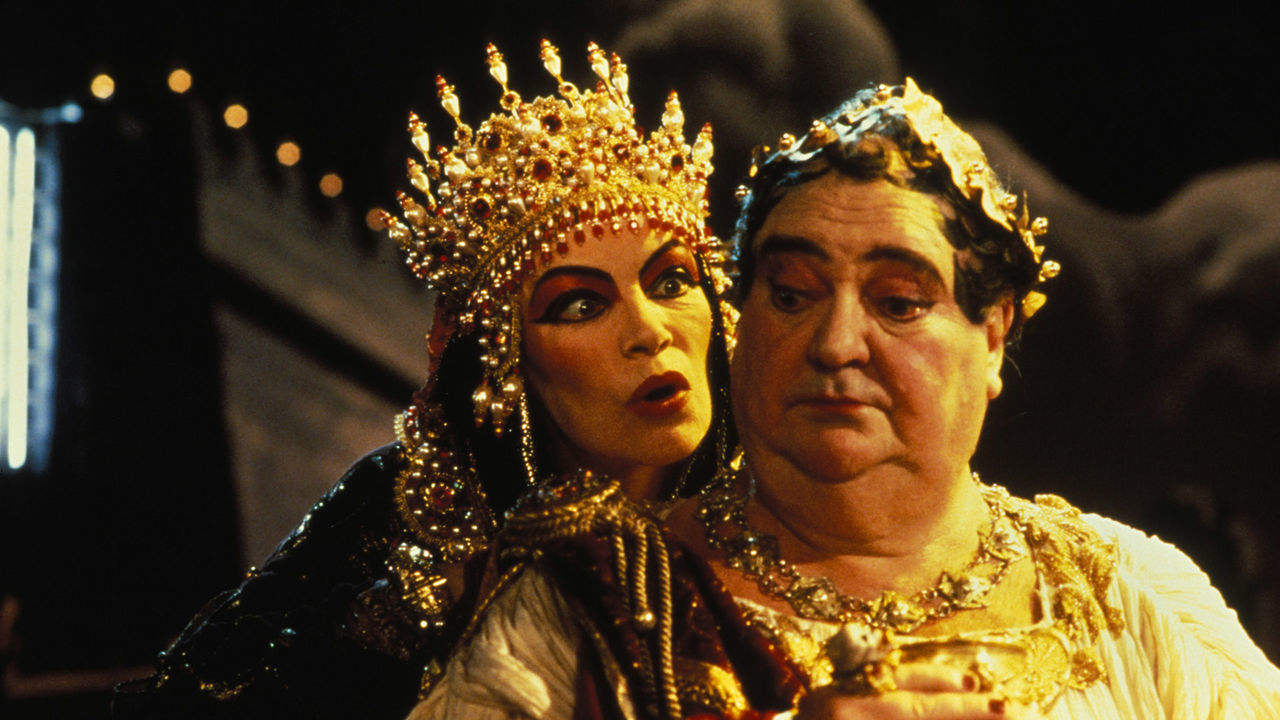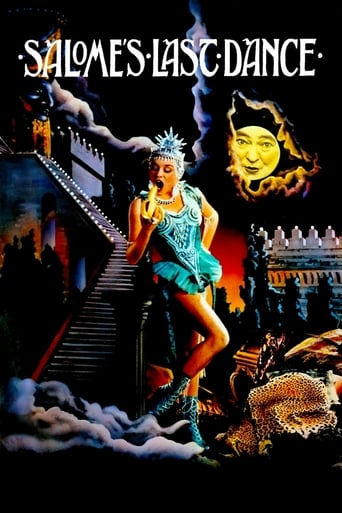

Salome's Last Dance is one of those films that will fascinate people or repulse them very like director Ken Russell's directorial style. First viewing I disliked it, seeing it again in a better mood just recently it was much better than remembered, though for me one of Russell's weaker films. A few things stop it from being a masterpiece. Russell does go overboard with the excess at times- not unusual for Russell- and some of those excessive images are disgustingly ugly, especially with Salome licking saliva off her face. Russell also writes himself in an acting role as a photographer and is rather embarrassingly bad and in a somewhat creepy way. Imogen Millais-Scott I had mixed feelings on, she is gorgeous, seductive and age-appropriate, though with a tendency to mug. Even with the excess, Salome's Last Dance does maintain the spirit of Oscar Wilde's play Salome with its beauty and ability to shock. The film is expertly filmed and the production values are a mix of the hypnotisingly beautiful and the decadent, which is hardly inappropriate(Strauss' opera Salome, which I personally love, has those qualities too). The music is a hodgepodge of classical music, and a wonderful hodgepodge at that, Rimsky-Korsakov and especially Debussy the prime composers and they further add to the beautiful yet shocking atmosphere. They are performed very well and mostly fit within the film. The script is witty and uproarious, Herodias has some truly hilarious lines, and the story is interestingly structured with a good touch of the theatrical and the cinematic. You cannot take your eyes away from the dance scene either. Most of the acting is better than its given credit, Glenda Jackson and Stratford Johns especially. Jackson is a little bizarre but also very regal and authoritative and Johns is suitably wry and mischievous, making a potentially tiresome character interesting. Nickolas Grace is a witty Oscar Wilde and Douglas Hodge a mostly effectively warning John the Baptist though he does over-compensate a bit. Overall, easy to see why people will dislike it, it's far from perfect but has interest points and entertainment value. 6.5/10 Bethany Cox
... View MoreFor a film made on a shoe string budget, one learns one too many a lesson; my favorite is the conception concerning the Baptist's voice coming up from his dungeon: with fumes and a greenish light coming out of a Carpenter film, this demonstrated how the latter should profit from this for his metaphysics and his camp.There is a lot too appreciate here, in the Ruskin sense of the word; do not be fooled by either the budget or the fart side of the scale, this is a very, very shrewd and sly reading of Wilde: his Salome and this Salome open up the new category of camp repression, with the film deliciously showing us that an author can be terribly indifferent to his work (especially when eager to amass all the boyish charm of a golden ass in his palm), a peculiar brand of catholic believer, Saint Oscar (Guy Fawkes Night is a great touch for this matter), that England is a brothel or only a brothel would have the courage to stage the banned play while at the same time entertain by its cast the imagination of its maker - and this is valid also for us: we are strangely moved in the end after all this extravagance. Even if at some point Wilde exclaims that he should not bother his imagination with the proceedings implying that it is a sin and a hubris to pass imagination through a trial (sic), and with this and other witticisms and intuitions Ken Russell's framing device makes Oscar Wilde a character escaping from his play into the brutal rebuttal of the public and its mores as voiced by Glenda Jackson's Lady/Herodias "it was not murder, but a banana slip!"(Watch how one of Russell's signature modes, the camp, exaggerated close-up of Jackson's exclaiming the phrase echoes the one in the beginning just before the show starts on Wilde's champagne glass.) In the feverish, camp theater of his mind, Salome, impish (great acting by the half blind, puckish Imogen Millais-Scott), precocious, looking so much like her mother (Herodias AND Lady Wilde??), she is the author's stand in - or is it he hers, as the Bosie/Baptist reversal also implies (and is so blandly delivered in the end)? The murder/ banana slip line surely reaches into what last century was called Wilde's self-destructive element but also Russell's wild comment on himself. Through this kind of fictional biography Russell's intuitive violence reaches after even the pivotal Wildean witticism "all bad poetry is sincere" and, somehow, poses it on its head. We are strangely moved in the end.
... View MoreKen Russell is -- how shall I put this? -- "not to all tastes". He is a talented and distinctive film-maker who has little interest in courting a mainstream audience. "Salome's Last Dance" is clearly targeted for viewers who fancy their entertainment on the decadent side. There are several positive aspects of this movie, but most usefully it contains a performance of Oscar Wilde's play 'Salome'. There is some bookend material at the beginning and the end of this movie, but the main action is Wilde's 'Salome'.MAJOR SPOILERS AHEAD. Basically, 'earnest' male lovers Oscar Wilde and Lord Alfred Douglas visit a London brothel one evening in 1895 for the usual reasons, only for Wilde to be honoured with a surprise performance of his quasi-biblical drama. Afterward, as Wilde and 'Bosie' are leaving -- apparently without having indulged in the brothel's usual transactions -- police arrive to arrest Wilde for his sexual crimes. The actors' performances are mostly excellent, particularly that of Stratford Johns as Herod in the play within the film. (Full disclosure: Johns was a client of mine; I did some publicity work for him in 1978 when he was Daddy Warbucks in 'Annie' at the Victoria Palace.) At the centre of this movie, though, there's a serious casting problem. Before the performance begins, Wilde is introduced to the child actress who will be portraying Salome ... and it's extremely obvious that this short-necked, narrow-hipped 'actress' is in fact a boy. At the climax of the film, when Salome drops her last veil, I was not remotely surprised by what popped out of it. Possibly Ken Russell intended this film for viewers who prefer seeing a boy dressed as a girl, rather than an actual girl ... however, his attempts to frame this as a surprise were utterly a failure. Russell himself appears briefly as a Victorian photographer, lumbered with an elaborate tripod-mounted bellows camera.There is one deeply disgusting moment when John the Baptist spits a gobbet of saliva into Salome's face, and Salome rapturously licks it off. Ugh! However, anyone familiar with Ken Russell's body of work likely expects to be disgusted occasionally.The art direction -- sets, costumes, lighting -- is excellent throughout, although I felt it unlikely that the brothel-keepers would have splashed out so much expense and effort on costumes for a single performance of 'Salome'. And the streets in the exterior shots are too clean.In any story putting historical figures in fictional situations, there are always some factual errors. Unfortunately, Russell commits errors here that are unnecessary. Wilde was arrested in April 1895, but Russell sets these events (including the arrest) on Guy Fawkes Night. I can't see any good reason for this. Guy Fawkes Day is an event that appeals largely to small boys (who beg financial contributions 'for the Guy'), devotees of fireworks, bonfire pyromaniacs and Catholic-bashers. I doubt that the Fifth of November had any special significance for Oscar Wilde.More fatally, there's a whopper of an error in the screenplay. Near the end of this movie, just before the peelers arrive, Oscar Wilde makes a sniggering comment about Sarah Bernhardt's wooden leg. In 1895, mind you. This is trebly an error: #1: Bernhardt's right leg was not amputated until nearly twenty years later (well after Wilde's death). #2: Bernhardt chose not to wear a prosthetic limb: her very few post-amputation performances were mostly done sitting down. And #3: Oscar Wilde publicly worshipped Bernhardt, so it's unlikely that he'd make a joke at her expense. (What is it with gay men and actresses?)I find this bad joke deeply emblematic of Ken Russell: he makes movies about famous people, but he clearly isn't interested in their actual achievements ... he only cares for the celebrity gossip and scandal. To Ken Russell, Sarah Bernhardt's career dwindles into insignificance, and what's really important is the (alleged) fact that she wore a wooden leg. If Ken Russell made a movie about Vincent van Gogh, Russell would ignore van Gogh's artwork and fixate on van Gogh slicing his ear off. (Actually, van Gogh cut off only a piece of his ear.)"Salome's Last Dance" shows that Ken Russell has mastered the technical aspects of film- making, and that he clearly isn't interested in more conventional subject matter. To call this movie repellent or decadent would be interpreted (among Russell's fans) as paying a compliment. Purely since Russell so fully achieved what he meant to do here, I'll rate this one 8 out of 10.
... View MoreThis film WAS created in 1988 by a small group of professionals on a shoe-string budget. However, it is as beautiful and uproarious as the Oscar Wilde original. In fact, nearly all of the dialog is Oscar Wilde's 'Salome', and is executed as deftly as possible. While none of the actors are A-list Hollywood types, they add the spice of life to the dark, sardonic wit of Wilde with skill and saleability. For those of us who have loved this movie for ten years+, the great news is that this film is now available in DVD format. If you are not shy about subtle humor, social anarchy, and a touch of good-natured sodomy, give this film a view.
... View More